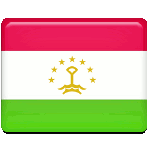Falak Day in Tajikistan Date in the current year: October 10, 2026
 Falak Day in Tajikistan is observed annually on October 10. It celebrates a style of Tajik music native to the Pamir Mountains (Kuhistani Badakhshan Autonomous Region). The holiday was officially established in 2007 by President Emomali Rahmon.
Falak Day in Tajikistan is observed annually on October 10. It celebrates a style of Tajik music native to the Pamir Mountains (Kuhistani Badakhshan Autonomous Region). The holiday was officially established in 2007 by President Emomali Rahmon.Tajik folk music originated many century ago and has a great variety of styles and genres. Falak holds a special place among them. It is a lyrical song genre through which the Tajik people have expressed their heartache, desires and aspiration for centuries. The word “falak” has two meanings. The direct one is “sky” or “heaven”; originally, the performers of falak songs addressed the skies when sharing their sorrows and joys. The figurative meaning is “fate”.
Falak originated in the Pamir Mountains, so it is native not only to southeastern Tajikistan, but also to northeastern Afghanistan (Badakhshan region) and northern Pakistan and India. While another well-known genre of Tajik folk music, shashmaqum, is known as the music of the valleys, falak is referred to as the music of the mountains. Tajik falak has two main styles: Kulyab and Pamir.
Falak songs can be written in different meter signatures: 2/4, 4/4, 5/8, 6/8, 7/8. Their lyrics traditionally consist of beits (couplets) or rubais (quatrains), but modern performers of falak also set ghazals composed by classical and contemporary poets to music. Some falak songs were clearly inspired by Sufi poetry, while others are more secular in nature.
Falak works consist of two parts: music and voice. The first notes of a falak song are usually performed a cappella (without instrumental accompaniment), and then traditional Central Asian instruments join the performance. Falak instruments include the dombra or dutar, ghijak, ney (tutak), setar, rebab, and percussion instruments such as dayereh and tabla. However, sometimes the entire song is performed a cappella.
Traditionally, falak songs were performed in mountain villages and passed from experienced performers called ustods (teachers) to their apprentices (shogirds — students). The genre became widely known relatively recently, in the early 20th century. The eponymous ensemble founded at the Kulyab Music and Drama Theater in 1989 has made an enormous contribution to the development of modern falak.
The inaugural Falak Day in Tajikistan was celebrated in 2004. Thee years later, President Emomali Rahmon gave the holiday an official status to highlight the importance of falak for Tajik culture. Falak Day is traditionally marked by music festivals, concerts, and other cultural events featuring notable falak performers from Tajikistan and other countries that consider falak part of their culture or have a significant Tajik population, including Afghanistan, Azerbaijan, Iran and Uzbekistan.
Considering the important role of falak in traditional Tajic culture, Tajikistani representatives have nominated it to be included in UNESCO’s Representative List of the Intangible Cultural Heritage of Humanity. However, as of 2021, the application was still pending. Interestingly, shashmaqam music was included in the list back in 2008.
- Category
- Cultural Observances
- Country
- Tajikistan
- Tags
- Falak Day in Tajikistan, holidays in Tajikistan, cultural observances, falak, Tajik music, Tajik culture